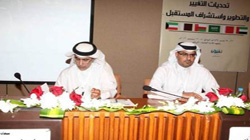

The Institute of Public Administration reviewed a research paper regarding the experience of the Kingdom of Bahrain in analyzing training needs through applying European Excellence Model for Quality in government institutions, during the participation in the second conference of the institutes of public administration and management development, which was held in Riyadh, Kingdom of Saudi Arabia, entitled challenges of change and development and looking up to the future, during the period from 10th to 12th December, 2012.
Through this paper, Senior Director of Basic Development and Creative Learning Mohammed Al-Saba'a discussed the concept of training and its importance and objectives and various methods of training, as well as focusing on the stages of training process in particular the process of identifying training needs through three levels (organization, functions, individuals), thus several supportive models and illustrations have been put forward to draw up training plans and build accurate mechanism in identifying training needs.
The paper debated tools employed to determine the training needs of meetings, workshops and interviews, also the paper presented a model on how to propose training courses drawn from the methodology for identifying the needs, and priorities of training have been monitored through a distinctive questionnaire, where its elements and some examples of the questions and used methods of analysis were displayed.
In the last part of the paper Mr. Al-Saba'a reviewed the followed methodology to employ European Model of Quality in government institutions, and the results that have been reached through a comprehensive study –carried out by the Institute of Public Administration – for training needs in the Kingdom of Bahrain in several government institutions in particular, where it proved its effectiveness and success in achieving the desired goals.
A number of elites of experts, intellectuals, and management practitioners and scholars in both public and private sectors took part in the conference, where the conference highlighted five elements included the actual and future administrative development, transformation and change in the government sector as well as oversight, accountability and transparency in government bodies, human assets and public sector development and finally successful experiences and initiatives in the fields of management development.
It is worth mentioning that the second conference of the institutes of public administration and management development comes as an extension of the conferences approved by the directors of institutes of public administration and development in the gulf countries, under the supervision of the general secretariat of the Gulf Cooperation Council (GCC) to achieve the objectives of the institutes of public administration and development represented in pushing the wheel of management development forward through discussing the issues and the problems of administrative development, and ways to address them under the current local, regional and international developments.
